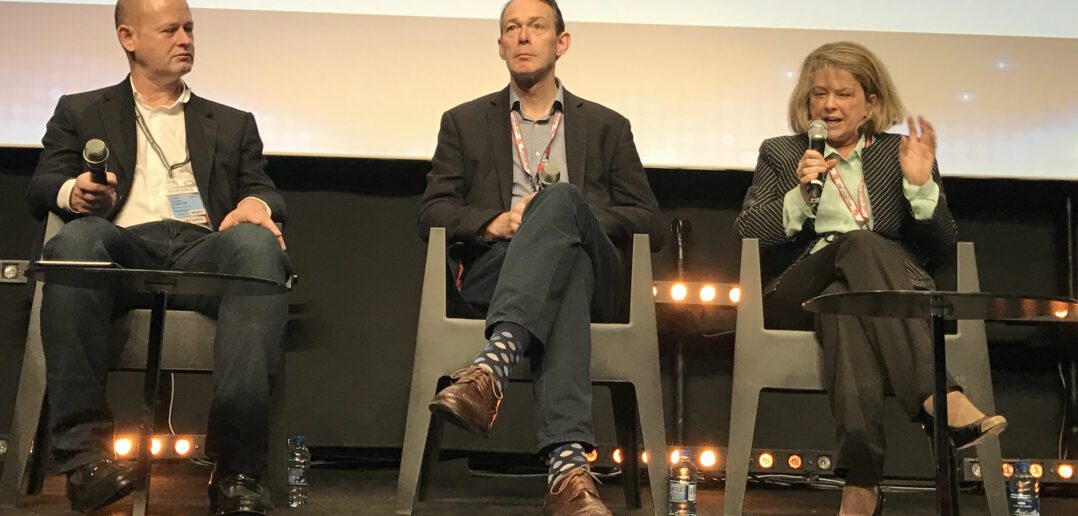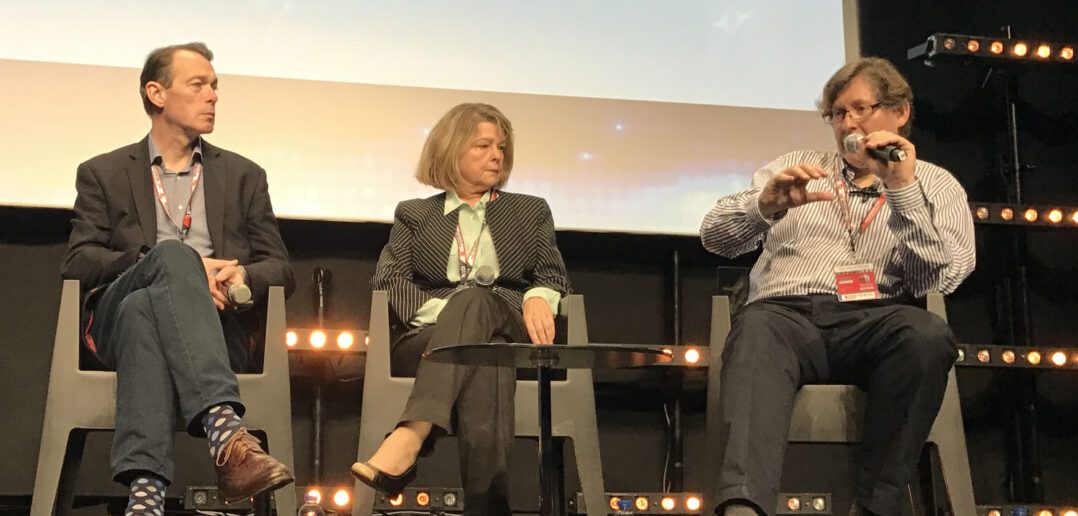The shockwaves from the UK’s vote to leave the European Union continue to reverberate in various industries, television included. Today at MIPCOM, a panel of experts convened to discuss what the likely impact of Brexit will be for European coproduction and other matters.
The panel included John Enser, partner at Olswang LLP; Amanda Groom, MD of The Bridge; Richard Johnston, CEO of Endemol Shine UK; and John McVay, CEO of industry body Pact. The moderator was Stewart Clarke, editor of TBI Vision.
McVay said that most Pact members voted to remain in the EU – 85% according to a survey. “So there was a period of mourning,” he admitted. “Everyone thought it was the end of the world… and when you sit back and do some analysis in terms of the regulations: we haven’t left the EU yet, we’re still trading, we’re still open for business.”
Johnston talked about the morning-after feeling in Endemol Shine’s UK office after the referendum result. “Everyone was taken by surprise,” he said. “To some extent we were all in an echo chamber, talking to people who broadly agreed with us, so it was a surprise… So a real sense of gloom, to be honest. But no immediate panic, I guess. Nothing much has happened yet, in truth. Some macroeconomic things have moved, particularly around the pound, but in terms of the TV industry itself, so far there hasn’t been much of an impact. It’s going to be about what happens next.”
Enser talked about the principles of free movement of people, services, goods and capital within the European Union, and what the impact of Brexit will be on television for each of those: for example, British producers hiring staff from abroad, and British creative talent working elsewhere; but most importantly free movement of services. “The ability of UK creators – programme makers, distributors – to sell their content around Europe,” and for broadcasters based in the UK to continue operating across Europe.
Enser noted that whatever new trading relationship the UK negotiates with the EU – a spectrum ranging from “soft” Brexit to “hard” Brexit – will be the key factor in determining all this. “Europe accounts for about 42% of our exports, and the rest of the world 58%… Europe’s very important to us,” said McVay, noting that British shows will still be counted as “European works” under continental regulations – the Council of Europe Convention. This will be crucial in how people think about coproductions, for example.
Groom’s company links British producers up with other companies around the world, so she’s seen the concerns, but also the optimism about potential business outside the EU.
“There’s been a lot of hard learning in coproduction with Asia. What has happened suddenly with Brexit is… English-speaking producers have realised what a phenomenal opportunity there is in Asia. Perhaps, if you like, out of desperation, my phone has certainly been pretty busy… All of the hard learning that has happened with Asia, Asian coproduction partners, Asian platforms, Asian business arrangements, strategic alliances, all of that learning has come to make dealing with Asia more straightforward than it ever has been.”
The hope is that these opportunities may make up for any difficulties experienced in selling British shows (or forging coproduction partnerships) in Europe, post-Brexit. Clarke wondered if the falling pound will also have an impact on the appeal of the economics of UK coproductions.
“It doesn’t have an immediate impact, but what it does do is drive inward investment: there’s a lot of American shows about to arrive in the UK, because the exchange rate is very favourable,” said McVay. “TV works in quite long cycles, so buying decisions, producing decisions are being made six months, 12 months hence, so it’s too early to tell,” added Johnston.
He said that for Endemol Shine, the real worry is any loss of freedom of movement for its non-British employees in the UK. “The UK has benefitted hugely from being this amazing creative hub… and any barriers to freedom of movement are going to diminish that,” said Johnston. “The more barriers and the more restrictions that are placed, the harder it will be.”
McVay said that the UK’s creative industries are currently around 6% people from elsewhere in the EU, and 5% from elsewhere in the world. “One of our arguments to government is if we can’t access global talent, then we won’t be as good,” he warned.
McVay did highlight potential moves that the UK could take to be more competitive on the global market post-Brexit, tax breaks included. “Don’t assume that we’re just going to sit on our hands and do nothing!” he said. “One of the areas that’s been talked about is high-end factual,” said Johnston. “That’s an area we’d love to revisit again, and see if the very successful effects the tax breaks had on drama and animation could be widened to other genres… Let’s widen them further if we can… It’s a conversation that’s been going on anyway, but I hope it can accelerate.”

Enser was asked about whether the creative industries will be a priority for the British government in its pre and post-Brexit dealings. He pointed out that the last government’s nine key industrial strategy areas did not include the creative industry.
“We’re playing catchup from that perspective. These negotiations are going to be very complicated,” he warned. “There are lots of moving parts, and it’s still quite early to see how that will shake out.” Groom suggested that the creative industries, particularly in the UK, “punch so high above their weight that it is a thing of real value, so any dent in that will have a knock-on impact, of course”.
McVay talked about the Creative Industries Council body, which is being consulted by the British government about the importance of fashion, music, design, computer games, music and other elements of the creative industry, which need to be factored in to Brexit discussions.
“They are growing faster than any other part of the UK economy, sometimes three times faster… so we are very important: job creation, importing and exporting… The UK is the second-largest exporter of TV, but also a dominant exporter in many of our other creative industries… With the right government support, we can do even better.”
McVay said access to global talent – not just the EU, but beyond – tariffs and trade barriers, and freedom of movement are the key issues. Clarke wondered whether the current path of the British government will rule out the latter. “The government’s position with the hard line on free movement of people makes it quite difficult to get easy exceptions through that,” said Enser.
“Many of the people who voted for Brexit were voting on that agenda… It is possible, but I think the other European countries are at the moment making very hardline noises. They are saying ‘you can’t cherry-pick the best of Europe: you can’t have the benefits of freedom of movement for your TV and film industry while denying the same freedom of movement for agricultural workers’… the UK cannot be seen to have a good deal.”
McVay agreed that there will be controls on migration into the UK, but noted that it won’t be a one-size-fits-all approach, just as it isn’t already for non-EU migration. “But I agree with John, the idea of an open door as we’ve had previously? That it’s definitely not going to be… It’s a very existential issue for our government to come up with a system that is reasonable, fair and transparent.”
Clarke asked about current EU funding for directors, producers, writers and others in the television industry, and whether the next generation of creatives will be hardest hit if those funds aren’t matched by the UK, post-Brexit. “If they’re not of course it will have an adverse effect,” said Johnston.
McVay noted that it’s hard to measure how much money is coming out of the EU, since it’s spread between many initiatives, including those supported by money paid in to the EU by the UK. “How do we get back, if we Brexit hard? How much money did we pay into Europe that supported the creative industries, and how do we know we’re going to get it all back to spend on our creative industries?.. There’s direct funding and indirect funding, so it’s hard to know how much,” said McVay.
Enser noted that when it comes to new EU legislation around copyright and other TV-relevant matters, the UK still has a formal seat at the table until it leaves the EU, but he questioned how loud the UK’s voice can be in the debates around those legislation, given its move towards an exit. But Groom offered a note of optimism. “In this time of uncertainty, it doesn’t hurt anyone to look further afield. There are pots of funding, highly talented people… all across Asia. So basically, whilst all this uncertainty is going on, it certainly doesn’t hurt to broaden the horizons,” she said.
McVay talked about a worst-case scenario of “vindictiveness” in Brussels and across Europe against the UK, if it opts for a hard Brexit. “I would hope politicians start moving away from punishment,” he said. Groom warned about restrictions of freedom of movement of people delivering a blow to the UK’s reputation for creativity, while Enser said that protectionism and trade barriers is the biggest concern, as well as companies deciding to pull out of the UK because “it feels little-minded and xenophobic” as a place.




